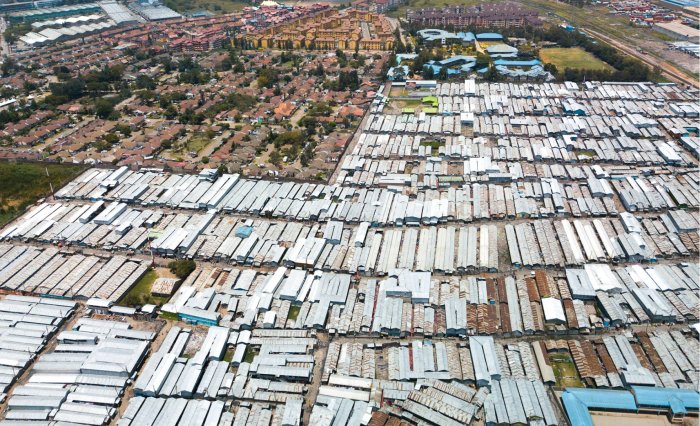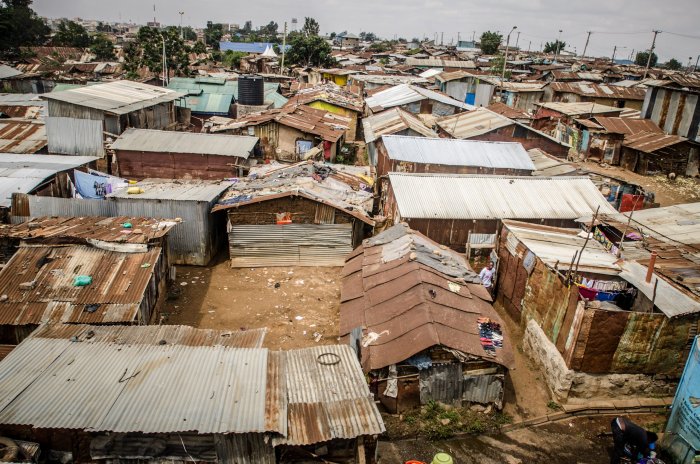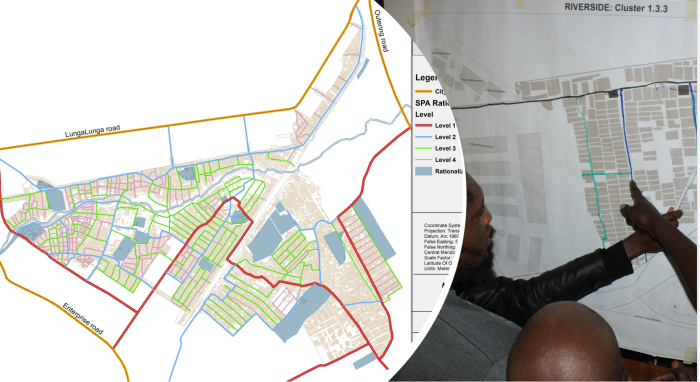Our cities have failed … decolonizing urban planning in the Afrocentric
How can rapidly urbanizing African cities realize just transitions while still prescribing the same conventional planning approaches that reproduced marginalization from the outset? This article discusses urban planning amidst ‘unorthodox’ manifestations of urbanization in Africa’s cities.
The failure of conventional planning systems in informal settlements forms a premise, with emergent frugal planning approaches such as Special Planning Areas (SPA) in Nairobi offering prospects for new rhythms of urban planning and development.
We stress here that our reference to ‘failure’ is not meant to discount the substantive progress by Africa’s cities towards a sustainable urbanization. It is rather a point of departure to inform better urban planning practice.
Planning in African cities has failed
Urbanization in Africa is happening at unprecedented rates, presenting unique challenges in planning and managing urban development (OECD, UNECA &AfDB, 2022). As cities transform rapidly, informal urbanism, which occurs outside the purview of formal planning frameworks, has emerged as an alternative pathway to city development. Consequently, planning narratives are hegemonized by failure stories owing to the informal construction of cities. Seemingly, compliance with existing regulatory frameworks is considered planning success and the contrary castigated as failure.
Afrocities are characterized by ‘informal-formal’ dualities. Informal urbanism is definitively considered ‘illicit’, bearing hallmarks of ‘failure’, while formal urbanism is deemed desirable; the epitome of ‘success’. Yet Africa’s urban realities are complex and dynamic, transcending such counterproductive binaries.
The continuation of elitist colonial planning legacies is linked to present-day urban planning shortfalls (Wanjiru-Mwita & Giraut, 2020). In Nairobi, for example, a colonial heritage of socio-spatial segregation persists, albeit implicitly, evidenced by the imposition of unrealistically high standards in the quest for modernistic, urban development. Contrasting urbanscapes of planned, gated communities alongside informal settlements (Fig. 1) thus persist.

Fig. 1 The ‘informal’ in Mukuru and formal environs ©Unequal scenes
Moreover, rather idealistic regulatory frameworks are crafted without evaluating the existing social, financial and political capital assets (Denoon-Stevens et al., 2022). Planning shortfalls are further aggravated by situated power contestations, political interferences and bureaucratic processes which we do not recapitulate in this article but which have been unpacked elsewhere (Watson, 2009).
While informal settlements are historically rebuffed, they account for 60-80% of Africa’s urbanism, thus predominantly contributing to city-making in this region (Carrizosa, 2022). There is growing realization that informality is a ‘defining’ feature of our world (Roy, 2009), and positive framings of urban informality are emerging in policy making (ibid. 2022). This has prompted a gradual shift towards alternative, frugal planning paradigms which embrace ‘the informal’ in lieu of fighting informality to ‘clean the city’. The perceived ‘failure’ hence has its opportunities.
Failing is good...
The persistent impoverishment, heightened vulnerabilities and multiple precarities in informal settlements may be interpreted as a depiction of how conventional planning has failed Africa’s urban majority. This failure, however, yields a double-edged outcome for understanding and planning the city. On the one hand, it entraps already marginalized communities into vicious cycles of vulnerability and survival. Conversely, the failure has created a space for contestation against counterproductive planning approaches, thereby spanning boundaries by embracing informality and its frugality. It is this latter thread that we wish to draw lessons from, dubbing it ‘good failure’.
The most eminent fruit of the perceived failure is a narrative shift. Emerging theses and practices posit informal settlements as ‘engines of the city’ where dynamism, collective action, community vitality, frugality and entrepreneurship conglomerate to create new forms of urbanism (Fransen et al., 2023a; Hati, 2020). This lens deconstructs the negative stereotypes about informality and attempts to add the perspectives of ‘informal urbanism as new way of life’.
This added nuance is not intended to romanticize informality, but rather to broaden the limited understanding and depiction of Africa’s heterogenous urbanity and to prompt rethinking of planning systems; hence shifting from a shallow marginal lens that obscures planning processes (Fig. 2) into a contextual lens with multiple intertwined realities that are central to meaningful planning (Fig. 3).


‘Good failure’ helps us understand the ‘informal’ as places and spaces confronted with vulnerability but which pro-actively engage in city-making through complex, dynamic socio-political processes.
The perceived failure has also accelerated reflective planning in re of conventional and emerging planning frameworks. With conventional approaches, planning for informal settlements or lack thereof, presents a paradox that perpetuates exclusive urbanism. Lack of planning fuels the stigmatization and disparagement of informal settlements with consequent socioeconomic precarities. Conversely, planning for them disregards the community’s agency with consequent forced evictions, decontextualized proposals and sparse community ownership.
In pursuit of alternatives, unconventional planning strategies are emerging, such as Kenya’s Special Planning Area (SPA) approach. This is a community-led, evidence-backed process that permits planning beyond the established ‘formal’ standards. It has created a radical shift from ‘planning for’ communities to ‘planning with’ communities, with an advanced process of co-creating alternative planning strategies (GCA, 2022). Its disruptive nature has leveraged frugal innovation in building cross-sectoral coalitions, engaging communities in action planning, defining adaptive planning standards and injecting conservative surgery to infrastructure planning (Hati, 2020).


Fig. 4 Conservative surgery © Hati, 2022
These practices and debates of ‘planning in the informal’ demonstrate that urban planning is a highly intricate, historically entrenched practice which must learn and evolve continually. Urban changemakers must awaken and deliberately depart from practices that pronounce colonial, capitalist and imperialistic heritage. But how can urban planning take such action?
Towards new rhythms of urban planning
The failure of conventional planning and the evolution of alternative (adaptive) planning offers four points of action to decolonize urban planning:
- Planning beyond ‘prescriptions’
Standardized planning frameworks create an important baseline for the practice, but are largely constructed on Western ideologies, which is far from Afrocentric realities. These frameworks must be rationalized to fit the context. For instance, the spatial requirements in the planning standards often make impracticable demands on informal settlements. Yet frugal strategies such as ‘the conservative surgery’ illustrated on Fig. 4 have created alternatives. Prescription reproduces marginality which can be avoided through contextualized standards.
- Adapting governance
‘Formal’ governance systems which exclusively hinge on conventionality are insufficient for the complex urbanism in Afrocities. The reconfiguration of governance into multi-actor, multi-level frameworks involving a plurality of state and non-state actors across ‘formal and informal’ spectra gives traction to adaptive governance configurations. The SPA governance configurations illustrate such fluid arrangements. These models are grassroots-led and hinge on a shared (community) vision, power equity among actors, shared responsibility and resource-matching. Embracing the ‘informal’ into governance means conscious interaction with contentious governance agents such as gangs, cartels and ‘slumlords’. Perhaps such a bricolage of formal and informal governance systems may negotiate pathways to just urban transitions.
- Restructuring participation
Participatory planning must be (re)structured to place communities at the centre of decision-making whilst establishing and sustaining strategic linkages to multi-level state and non-state actors. This accelerates collective exploration and experimentation with context-fit solutions. A shift from mere consultation to promoting open dialogue and partnerships among various actors has a strong potential to shift mindsets from rigid conventional approaches to a negotiated planning approach. Hence all actors have a stake, leveraging their strengths, creativities and available resources to maximize value and mutually benefit from the process.
- Maximizing research value
Robust, community-generated evidence has been the antecedent of the disruptive planning processes discussed in this article. For example, the ‘poverty penalty’ and ‘Too pressed to wait’ research insights compelled the adoption of the first SPA in a large informal settlement – Mukuru. The ratification of another SPA in Mathare informal settlements, spearheaded by Mathare SPA Research Collective, is equally evidence-based, albeit uniquely premised by widespread research saturation, research fatigue and impact-less research; what we call ‘Research Waste’. A database of research on Mathare is being developed to support evidence-based planning and as a tool to address unsystematic research duplication. We underscore the importance of research in informing policy and strengthening advocacy for better planning. Nonetheless, there is urgent need to tame the fast-paced knowledge circus, especially in informal settlements, and build vigilance around research methodologies, power imbalances and research uptake.
As we embed these ‘new’ rhythms towards an impactful urban planning practice, it is imperative to engage the multiple actors previously mentioned as well as next-generation urbanists and change-makers in transformative thinking.
Bibliography
- Carrizosa, M. (2022). Urban informality and the making of African cities (Issue March).
- Fransen, J. et al. (2023) ‘Community vitality and frugal practices in informal settlements in Nairobi: Towards a typology’, Cities, 134(January), p. 104179. doi: 10.1016/j.cities.2022.104179.
- Global Center on Adaptation (GCA, 2022) Locally-led planning: a guide for building climate resilience in urban informal settlements.
- Hati, B. G. (2020) ‘Adopting Collective Frugality in Rethinking, Re- planning, Reimagining urban informal settlements.’, in The International Society of City and Regional Planners, ISOCARP. Den Haag, Netherlands: The International Society of City and Regional Planners, ISOCARP, pp. 952–964. doi: ISBN 978-90-75524-67-3.
- Organization for Economic Cooperation and Development (OECD, UN ECA & AfDB, 2022) “Africa’s Urbanisation Dynamics 2022: The Economic Power of Africa’s Cities, West African Studies, OECD Publishing, Paris. doi: 10.1787/3834ed5b-en.
- Roy, A. (2009) ‘Why India cannot plan its cities: informality, insurgence and the idiom of urbanization.’ Planning Theory, 8(1), pp 76-87.doi: 10.1177/1473095208099299.
- Wanjiru-Mwita, M. and Giraut, F. (2020) ‘Toponymy, Pioneership, and the Politics of Ethnic Hierarchies in the Spatial Organization of British Colonial Nairobi’, Urban Science, 4(1). doi: 10.3390/urbansci4010006.
Our cities have failed … decolonizing urban planning in the Afrocentric
Beatrice Hati is doctoral researcher at ISS and research and urban development associate at the International Centre for Frugal Innovation/ Nuvoni Centre for Innovation Research.

Alice Menya is urban programme coordinator at the International Centre for Frugal Innovation/ Nuvoni Centre for Innovation Research.